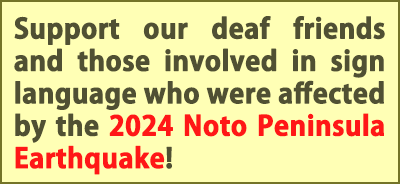from 1 April 2009 Issue of Japanese Deaf News, JFD’s monthly newspaper:
From the Editorial Column of The Japan Times Online, Sunday, Feb. 18, 2007:
By May 2009, Japan will introduce a lay judge system in which ordinary citizens will take part in criminal proceedings as judges to help decide the outcomes of trials. …The use of lay judges is a big change in the nation’s legal system. The Supreme Court, the Justice Ministry, the Japan Federation of Bar Associations, lawyers, law professors and others need to make concerted efforts to enlighten the public about the lay judge system, to facilitate their participation in it and to eliminate potential problems with it.
The Japanese Federation of the Deaf (JFD) and Japanese Association of Sign Language Interpreters (JASLI) had a meeting with the Supreme Court regarding the new Lay Judge System on March 6th. From JFD, General Secretary Eiichi Konaka, and Norihiko Nishitaki (Board Member and Head of the Sign Language Interpretation Section) participated.
In the meeting, the Supreme Court answered questions from JFD on information access when a deaf citizen is selected as a lay judge. The Supreme Court said that they are planning to provide sign language interpretation, captioning and other options for the Deaf lay judge to choose from for information access to the court proceedings. The Supreme Court also says that they will make the notification letter that will be sent out easier to understand.
JFD made some requests to the Supreme Court such as putting fax number for inquiries on the documents, setting up training for sign language interpreters similar to those offered to foreign language interpreters working in the courts and other legal processes, and using interpreting agencies associated with JFD instead of appointing interpreters personally. JASLI also made some inputs, one of which was that interpreters should be at nationally certified in order to interpret at the court, because of the tremendous responsibilities and high skills required for the job.
Regarding the concerns raised on whether district courts will follow the Supreme Court’s policy, the Supreme Court said “It is difficult for the Supreme Court to set fixed standards. It will probably have to be done by visiting district courts and explaining to each district court individually.”
JFD, JASLI and the National Research Association for Sign Language Interpretation will develop a guideline on sign language interpreting for the Lay Judge System and send it to the Supreme Court and other related organizations in future.


